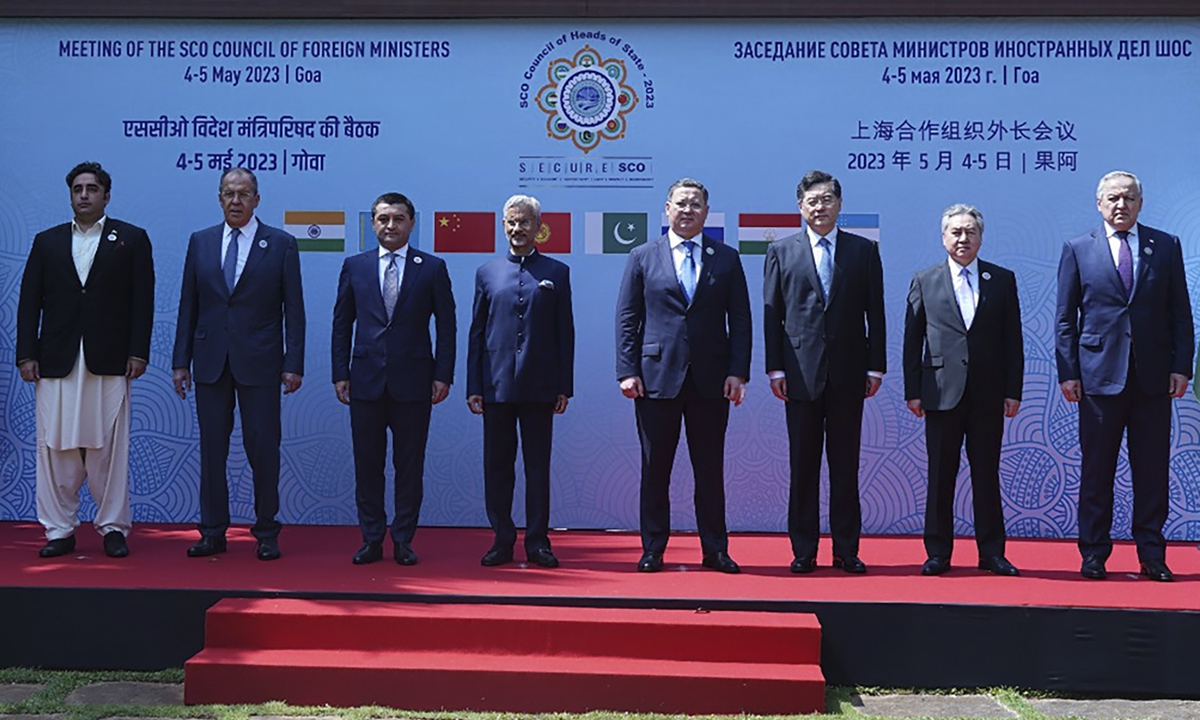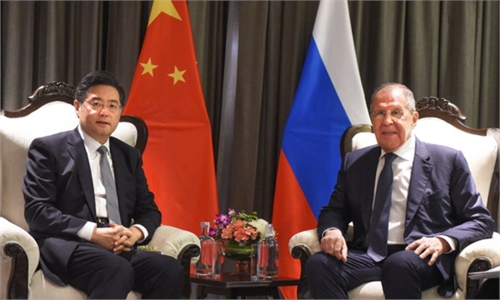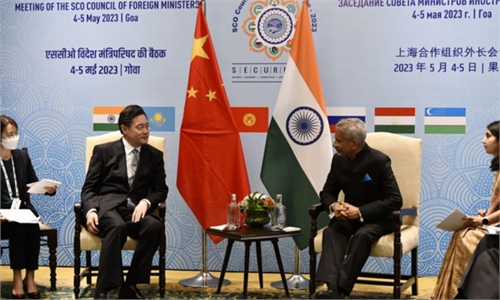China stresses strategic autonomy, security cooperation at SCO meeting
Consensus on security, politics, and economy shows enduring vitality: experts

Foreign ministers from SCO member states pose for a group photograph prior to the Shanghai Cooperation Organization (SCO) Council of Foreign Ministers' Meeting, in Goa, India, on May 5, 2023. Photo: VCG
Chinese State Councilor and Foreign Minister Qin Gang called on the members of the Shanghai Cooperation Organisation (SCO) to build a closer SCO community with a shared future at a time when the world faces challenges and crisis including the resurgence of the Cold War mentality, surging unilateral protectionism and rising hegemonism, while proposing a five-point suggestion at the SCO Foreign Ministers' Meeting in Goa, India, on Friday.
Chinese experts hailed the SCO meeting as a success that fully demonstrated the attraction of the SCO philosophy, namely, promoting regional stability and development through equality and mutually beneficial cooperation, openness and inclusiveness. This is in stark contrast to the confrontational mindset and bloc politics of some Western politicians.
In the context of the intensifying game between major powers, maintaining the momentum of SCO solidarity and cooperation is of great significance to global governance as well as the process of multi-polarization, they said.
During the two-day event, SCO members agreed to further strengthen security cooperation and jointly fight terrorism, separatism, drug trafficking, and cyber crimes. They also agreed to promote cooperation in the fields of transport, energy, finance, investment, free trade and digital economy, as well as environmental protection and jointly deal with climate change, according to a readout from the Chinese Foreign Ministry.
On regional issues, SCO members support Afghanistan in achieving national stability and reconstruction, support the SCO in strengthening cooperation with the UN and BRICS, safeguard the principles of the UN Charter and uphold multilateralism. They agreed to strengthen the establishment of a regional anti-terrorist structure.
All parties agreed to advance the SCO enlargement process in an orderly manner and further enhance the international influence of the SCO. According to reports, Iran and Belarus are expected to be the newest SCO members in the future.
The SCO Foreign Ministers' Meeting has made comprehensive preparations for the SCO summit to be held in New Delhi in July, according to the Chinese Foreign Ministry.
Li Yongquan, director of the Eurasian Social Development Research at the Development Research Center of the State Council, told the Global Times on Friday that the consensus reached by SCO foreign ministers showed that the SCO member states are as committed as ever to cooperation in security, and at the same time hope to make breakthroughs in new areas such as cyber space and supply chains.
The consensus shows that the SCO's philosophy and development prospects have been fully recognized by its member states, and reflects the SCO's role as an important multilateral platform for practical cooperation and communication among countries, Zhao Huirong, an Eastern European studies expert from the Chinese Academy of Social Sciences, told the Global Times on Friday.
'Shanghai Spirit'
On Friday, Qin stressed the need to carry forward the "Shanghai Spirit," or the undergirding values and guidelines for the SCO, featuring mutual trust, mutual benefit, equality, consultation, respect for diversity of civilizations, and pursuit of common development.
With that premise, Qin called on SCO members to uphold strategic autonomy, strengthen unity and mutual trust, and oppose external forces' meddling in regional affairs and instigating "color revolutions."
Qin also suggested continuing to deepen security cooperation and resolutely cracking down on all forms of terrorism, drug trafficking and transnational organized crime.
He also suggested that SCO members resolutely resist any action that undermines the international economic and trade order and market rules, and that the stability of industrial and supply chains be maintained.
In addition to politics, security and economy, Qin's five-point suggestion also included the SCO's development in global governance and the development of the SCO's organization mechanism.
The SCO is in a critical period, during which challenges and opportunities coexist, so Qin pointed out five aspects in which SCO can play a more important role in promoting a more just and reasonable international order, Zhao Huirong said.
"China has a clear plan for the future development of the SCO, which is based on the common interests of all member states, and that's why Qin's suggestion has been positively recognized by all parties," Zhao noted.
"The SCO member states differ in social and economic systems, cultures and history… They can live in harmony with each other mainly because they adhere to the SCO Charter and articles of association and especially follow the 'Shanghai Spirit'," Li Yongquan said.
Against the backdrop of an intensifying game between major powers, maintaining the momentum of SCO solidarity and cooperation is of great significance to regional stability, development and global governance, Li said.
The ministers' consensus on security is important for maintaining regional stability, given that the Ukraine crisis has provided a brutal example of the consequences of outside forces' meddling in Eurasian affairs, Li added.
Facts speak for themselves
Citing experts, some Western media claimed that the SCO "won't have to contend with an East-West split over the war in Europe," and doubt that the members will be able to achieve practical cooperation, as there's internal conflict.
However, the facts speak for themselves. During the two-day event, a series of bilateral meetings were held in a frank manner at the SCO meeting platform, which analysts viewed as a convincing response to the West's "sour grapes" and attempts to smear and sow discord among SCO members.
Chinese State Councilor and Foreign Minister Qin Gang met with Russian Foreign Minister Sergei Lavrov on the sidelines of the SCO Foreign Ministers' Meeting on Thursday, during which the two sides agreed to maintain the overall unity and cooperation of the SCO, and build the SCO into a platform for mutually beneficial cooperation among member states. They also exchanged views on the Ukraine crisis.
When meeting with Indian External Affairs Minister Subrahmanyam Jaishankar, Qin said the two sides should continue to make efforts to further ease the situation on the China-India border in order to maintain sustainable peace and stability in the region.
Pakistani Foreign Minister Bilawal Bhutto Zardari also spoke with Lavrov in a bilateral meeting, and the two sides exchanged views on the situation in Afghanistan, according to media reports.
As the foreign minister from the host country, Jaishankar also spoke with his counterparts from China, Russia and Uzbekistan on the sidelines of the SCO meeting, on topics ranging from bilateral and multilateral cooperation to global and regional issues, according to ANI News.
Although no bilateral foreign ministers' meeting was held between Pakistan and India, according to Indian media, Jaishankar on Thursday welcomed Zardari, the first visiting Pakistani high-ranking official in nearly a decade. Analysts from Channel News Asia see it as "small but crucial progress" in their relationship.
It is natural for different countries to have differences. It is precisely because of the existence of the SCO that member states can better manage differences and common challenges through dialogue and cooperation, rather than through hegemonic coercion, Zhao noted.
"The close communication and exchanges between the foreign ministers show that the SCO member states take their relations seriously and support the organization in maintaining high spirits and strengthening its functions," Li Haidong, a professor at the China Foreign Affairs University, told the Global Times on Friday.
"This is a vivid manifestation of the SCO's enduring vitality," Li said.
In both multilateral and bilateral talks under the SCO, the foreign ministers discussed not only topics concerning their own interests, but also major international events, reflecting SCO's global influence as a regional organization, Li said.
"In the western end of Eurasia, the expansion of NATO has led to the Ukraine crisis and a tragedy in Europe. The existence and development of the SCO has injected more positivity into Asia," Li said, noting that "China's initiatives on global security, development and civilization are reflected in the development of the SCO."
SCO nations account for 40 percent of the world population, and also a third of global GDP.
With broad representation and solid strength, the SCO has a bright future and will play a greater role in major international and regional issues, which the international community is happy to see, Li said.



